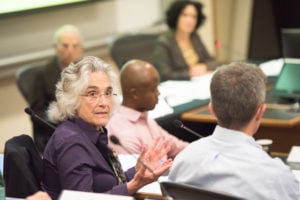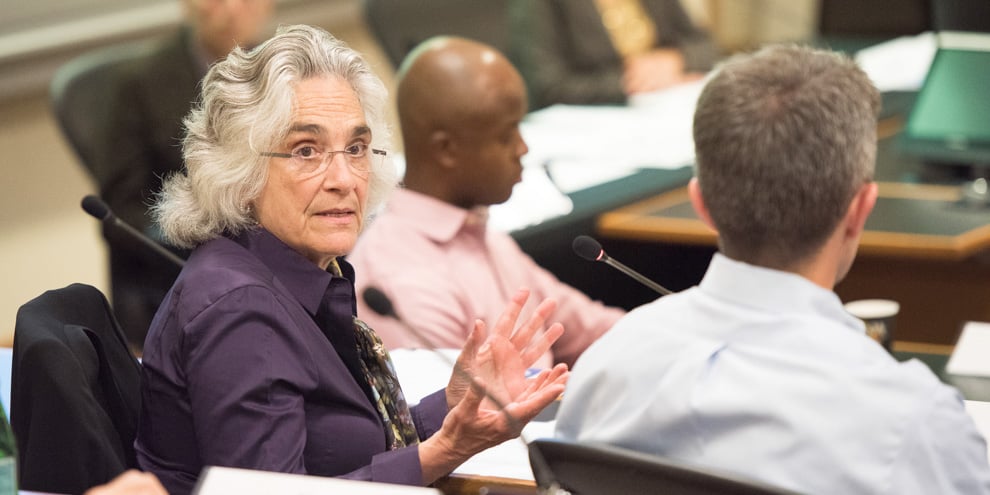In its last meeting of the quarter, the Faculty Senate received reports on postdoctoral affairs, discussed Stanford’s response to the proposed tax reform and the long-range planning process and passed a resolution acknowledging the Muwekma Ohlone tribe’s support for Stanford.

Long-range planning
With the analysis of the proposals from members of the Stanford community complete, the steering groups have cleared the second of three stages in Stanford’s long-range planning process. Some 2,802 proposals were delegated to four separate steering groups named Research, Education, Our Community and Engagement Beyond Our University. The chair of each steering group briefly updated the Faculty Senate on its process and high-level findings on the community proposals gathered in the first phase.
Steering groups either categorized proposals in different areas with hashtags, analyzed common motifs that formed the basis of the group’s white papers or both. The groups were careful not to “pick winners and losers,” and the 37 white papers will be available to the public on Feb. 1.
According to Juliet Brodie, co-chair of the Engagement Beyond Our University group and Associate Dean for Clinical Education at Stanford Law School, many proposals said that Stanford needs to serve as an example for the rest of the world given its reputation as a global leader in research and education. Sustainability was also a prevalent theme in proposals across the four major categories, leading the steering groups to collaborate on a single white paper about the issue.
Once the white papers have been released and the Executive Cabinet forms a cohesive vision and action plan, stakeholders will vet and finalize the plans in the spring, marking the end of the formal long-range planning process.
“I want to emphasize that this [formal long-range planning process] is the start, not the end of long-range planning [at Stanford],” said co-chair Susan McConnell.
Postdocs
The Faculty Senate also received a report on postdoctoral affairs at Stanford, which emphasized the critical role postdocs play at Stanford and highlighted several urgent issues that they face.
According to University postdoctoral data, Stanford has seen a disproportionately rapid growth in the postdoc population in the last 15 years, rising by 73 percent compared to a 27 percent growth in faculty. A 2016 survey found that 70 percent of postdocs mentored students, five percent filed patents, 17 percent taught, and 66 percent performed administrative duties for research groups.
Associate Dean for Postdoctoral Affairs Sophie Kelppner said that Stanford leads the nation in postdoctoral training and that “all postdocs are treated equitably.”
However, postdocs face significant challenges, especially regarding affordability. According to Anand Rao, a postdoc in Anesthesiology, Perioperative and Pain Medicine who serves as chair of the Stanford University Postdoctoral Association (SURPAS), postdocs have had two-hour commutes and often barely make ends meet with the high cost of living in the Bay Area. In addition, a 2016 survey of postdocs revealed that 15 percent were dissatisfied with research mentorship from professors, and one in four were dissatisfied in career mentoring.
Diversity among postdocs is also low, with only four percent coming from under-represented ethnic minorities.
Proposed solutions to these issues include increasing the minimum salary for postdocs, subsidizing housing and child care, fundraising for postdocs and implementing a cohort model of recruiting and training postdocs. However, some members of the Faculty Senate questioned the idea of a cohort as expectations and responsibilities vary across fields.
Tax bill
University President Marc Tessier-Lavigne also updated the Faculty Senate on Stanford’s response to the U.S. Congress’s tax reform. The proposed bill in the House would repeal student loan interest deduction, tax employee benefits, university endowments and tuition credits.
“We [at Stanford] firmly believe that [tax policies beneficial to education] should not be undercut,” Tessier Lavigne said, adding that the changes were proposed simply to offset tax revenue lost from other tax cuts rather than realize a sound policy.
According to Tessier-Lavigne, Stanford’s leadership has engaged with “leadership on both sides of the aisle” in Congress and the Executive Branch to emphasize the negative repercussions of the proposed cuts.
As the meeting drew to a close, Provost Persis Drell announced that the search committee for the new Vice Provost of Research has been assembled and will convene shortly.
In light of November being National American Heritage month, the Faculty Senate also unanimously passed a resolution acknowledging the Muwekma Ohlone tribe’s support and affirming the importance of the the Stanford-Muwekma Ohlone tribe partnership.
”The Faculty Senate wishes to recognize the Muwekma Ohlone tribe of the San Francisco Bay Area upon whose traditional territory the University resides,” the resolution read. “The Senate offers sincere thanks to the Muwekma Ohlone tribe for over a century of support of the University’s mission and land stewardship activities. We affirm the importance of this enduring partnership.”
Contact Christina Pan at capan ‘at’ stanford.edu.
